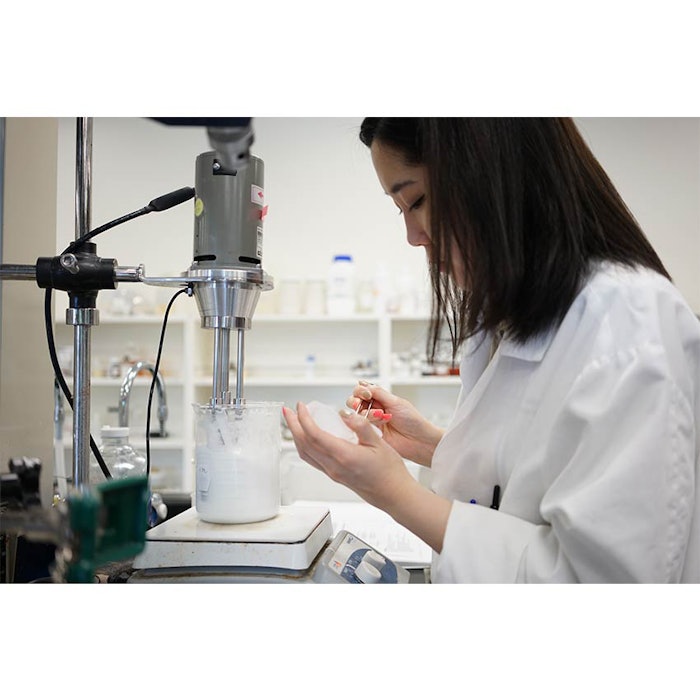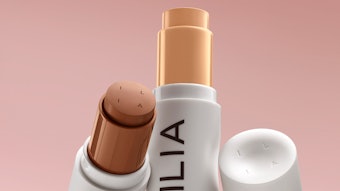
As the color cosmetic market heats up, Englewood Lab is expanding into the makeup segment to meet rising demand for R&D, innovation and manufacturing in the United States.
From Skin Care to Color Cosmetics
David C. Chung, founder and CEO of Englewood Lab began his career in beauty retail. Working with products and the brands led him to recognize a need for U.S.-based contract manufacturing that delivered R&D innovation to bring creativity, newness and differentiation to prestige skin care.
Chung launched Englewood Lab in 2004 and has enjoyed double-digit growth ever since; in 2016, the firm saw sales rise 32%. Since its founding, Englewood expanded its R&D and manufacturing footprint by 22,000 square feet and later added a further 150,000 square feet for manufacturing, innovation, packaging and distribution.
While the largest brands tend to have well-articulated briefs, Chung noted that small- and medium-sized customers often begin with less detailed plans.
In October 2015, Englewood Lab established the Englewood Lab Korea innovation center to deliver Asian technology to the U.S. market, which aligned the manufacturer with the broader K-beauty boom.
Most recently, Englewood Lab received an investment from Japan-based contract manufacturer Nihon Kolmar* to boost Englewood’s capabilities in the fast-growing color cosmetics sector. The move is a perfect fit for the company because many of Chung’s customers already operate in both the skin care and makeup segments, including beauty powders, lip products, BB/CC creams, etc.
The Clients
Englewood Lab formulates roughly 80–90% of the products it manufacturers, including variations on existing benchmark products and novel concepts. Chung noted that the company is currently working with about 100 brands, including top multinational brands, mid-level players, emerging indie beauty startups, department stores, direct-selling companies, doctor-led brands, multilevel marketing firms and more.
Because so many of the top color cosmetic brands outsource their color manufacturing, Chung spotted an opportunity.
While the largest brands tend to have well-articulated briefs, Chung noted that small- and medium-sized customers often begin with less detailed plans. That’s where Englewood Lab’s staff steps in to consult on brand positioning, bulk price targets, natural status, distribution and other key elements in order to craft a more fully articulated blueprint. For this reason, Englewood spends a lot of time selecting which startups to partner with.
The Products
Englewood Lab traditionally worked with a range of skin care customers and found itself producing many SPF products. However, in the last five or six years, Chung noticed rising requests for innovative color cosmetic manufacturing in the United States as that segment began to heat up. And, because so many of the top color cosmetic brands outsource their color manufacturing, Chung spotted an opportunity.
By bridging into color cosmetics, Englewood Lab is able to produce skin care-makeup bridge products, which are experiencing rising popularity on the heels of IT Cosmetics’ meteoric rise. Clients are also looking for foundations with skin-brightening effects, as well as products containing antioxidants such as vitamin E, in addition to anti-aging claims and formulations with transformational textures. Chung noted that Nihon Kolmar, with its extensive color cosmetic experience, can help Englewood Lab troubleshoot makeup issues when necessary.
Inexperienced brands may rush the packaging process and commit to attractive components before confirming their compatibility with the formula.
With the latest expansion, Chung aims to bring technological innovation from around the world—particularly Asia—to the U.S. market. Most recently, Englewood Lab acquired unique filling equipment from China, which allows the manufacturer to use encapsulation to create unique product effects such as suspended “petals” within a product matrix. The manufacturer is also looking to invest in mechanical pencil technology to counteract the format’s typically extensive lead times.
Englewood Lab is also addressing clients’ and retailers’ forbidden ingredient lists to ensure that formulations remain compliant. And it's exploring new product formats, such as a high-efficacy natural stick soap available in a range of shapes and colors.
Manufacturing Challenges
Customers often need turnkey service for packaging, which is the component of product development that requires the longest lead time. As a result, Englewood Lab has established a packaging procurement office in Shanghai to expedite matters. Englewood will also test packaging to ensure compatibility for customers.
Chung noted that inexperienced brands may rush the packaging process and commit to attractive components before confirming their compatibility with the formula. At the same time, they may not account for discontinued ingredients that will require reformulations that will in turn necessitate new stability tests. Which is why a trusted manufacturing partner is critical.
It’s All about Capacity
Most brands don’t wish to work with too many different manufacturers, said Chung. As a result, capacity is a critical consideration. Since its founding, Chung has expanded his facilities in several stages, and added R&D and sales and packaging staff as demand grew.
Englewood Lab currently has facilities in Englewood and Totowa, New Jersey, just outside New York City, including quality assurance and control, regulatory compliance, manufacturing, compounding, filling and packaging. The current facilities can produce batches of 30–2,000 kg and include an ISO 7 cleanroom filling chamber.
Englewood Lab’s R&D team comprises 22 chemists, with skin care and cosmetics areas of expertise housed in separate sections of the facility.
This is in addition to the previously mentioned R&D and turnkey manufacturing facility in Korea. Englewood Lab’s capabilities on both sides of the world are identical, allowing clients to split their manufacturing between the United States and Korea as needed.
Englewood Lab’s R&D team comprises 22 chemists, with skin care and cosmetics areas of expertise housed in separate sections of the facility. The manufacturer also features a regulatory department that can handle challenges such as overseas expansion.
As for Englewood Lab’s future, Chung explained that, as the full owner of the manufacturer, he can expand the company further as needed.
*No affiliation to Kolmar Lab in Port Jervis, New York.










